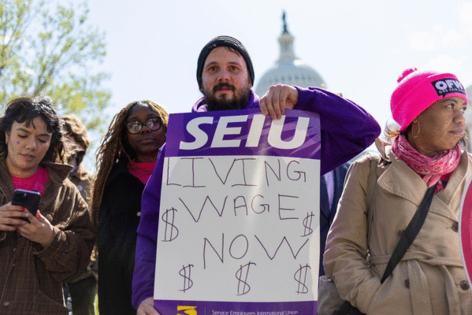Commentary: Trump takes aim at minimum wage
Published in Op Eds
For months, the Trump administration has been waging a multi-front war on the working class: ending collective bargaining rights for more than 1 million federal workers, ripping up signed union contracts, muzzling the agency tasked with overseeing private sector bargaining laws, and strangling manufacturing jobs while driving up costs for working families with costly tariffs.
Now Trump and his team are opening a new frontier by attacking minimum wage protections that benefit federal contractors, disabled workers and home care workers.
The first casualty was the minimum wage for federal contractors. In 2021, the Biden administration upped the minimum wage for private-sector workers on federal contracts, giving an estimated 327,300 workers a raise of about $9,256 per year. When the Trump administration assumed office this past January, these workers were earning at least $17.75 per hour — more than twice the current federal minimum wage. However, in March, the Trump administration revoked Biden’s executive order, reducing the allowable minimum wage on federal contracts to $13.30 per hour.
Next, the Trump administration reversed a policy that would have prevented corporations from legally paying disabled workers far less than the minimum wage. Federal minimum wage law allows employers to apply for a certificate, called a Section 14(c) waiver, which allows them to pay some disabled workers an average of $4 an hour in some states, rather than the federal minimum wage of $7.25. As of July 2024, an estimated 38,000 people were earning subminimum wages due to these waivers, which are held by more than 600 employers.
The Biden administration was in the process of ending the use of these waivers. But as part of its agenda to “unleash prosperity through deregulation,” the Trump administration withdrew the proposed rule change in July.
While the administration claims these waivers are necessary to provide employment opportunities for people with disabilities, states that ended the use of 14(c) waivers have seen no decrease in labor force participation among workers with intellectual disabilities.
Domestic workers’ wages are under the most dire attack. In July, the Trump administration proposed a rule that would eliminate minimum wage protections for approximately 3.7 million domestic workers — workers who provide in-home care for children, and allow aging and disabled people to live independently in their own homes and local communities.
Home care workers already make low wages — the median pay for a home health aide amounts to $34,900 per year. Exempting these employees from the federal minimum wage law will allow employers to cut wages for millions of domestic workers to less than $7.25 per hour, as well as avoid paying them overtime.
Domestic workers were excluded from the federal minimum wage law passed in 1938 in order to win support from southern Democrats, who opposed extending the protections to a sector that largely employed Black workers. While home care workers won minimum wage and overtime protections in 2013, the Trump administration is now reopening the loophole.
And while the administration claims the 2013 rule might discourage the use of home care services, similar minimum wage policies have had little to no impact on employment — much like in the case of disabled worker protections.
Just after Labor Day, the administration finished collecting public comments on its proposal to remove domestic service workers from the federal minimum wage law. Next, the administration will decide whether or how to implement its proposed rule, but even before then it has stopped enforcing the minimum wage for these domestic workers.
Workers are already reeling from Trump’s tariff turbulence and a slowing economy, and cuts to minimum wages and overtime will make matters worse for working families. Getting rid of minimum wages empowers corporations to underpay workers, at a time when families are already feeling squeezed. It is incumbent on all of us to demand accountability from an administration that promised to make life greater — not worse — for working families.
_____
Aurelia Glass is a policy analyst for inclusive economic policy at the Center for American Progress. This column was produced for Progressive Perspectives, a project of The Progressive magazine, and distributed by Tribune News Service.
_____
©2025 Tribune Content Agency, LLC.
























































Comments